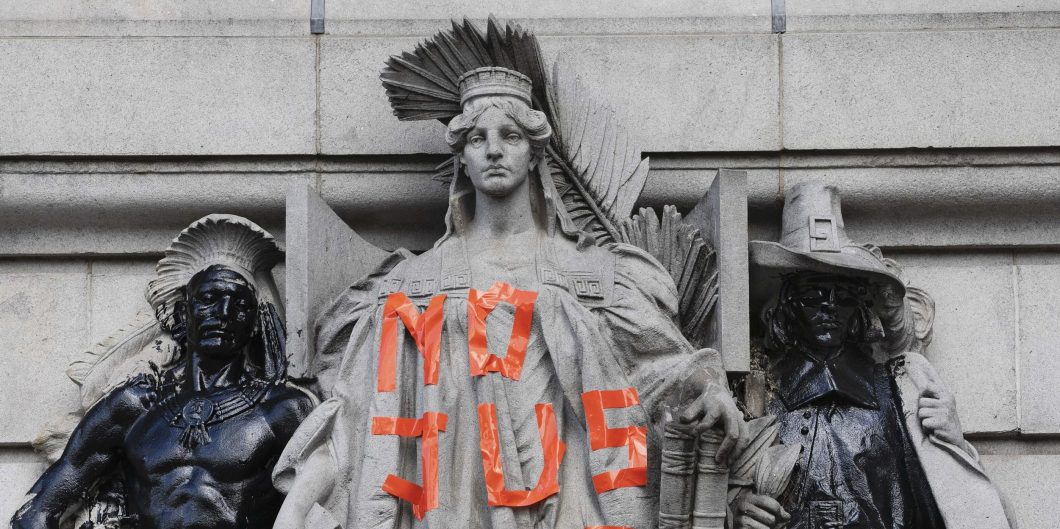Hopelessness in the New History
In May, Law & Liberty ran a forum debate on the nature of modern socialist thought. Prominent among the criticisms raised are points applicable to current leftist ideology overall: its historicism, relativism, and nihilism. I have certainly shared in this concern, noting this of the New York Times’ 1619 Project and of its editorial board’s exploitation of the current pandemic. However, this attempt to rewrite the social and historical narratives of both American history and economic history in general embraces what we might call a loose construction of fact.
In this attempt to revise the narratives of capitalism and the development of the modern world, the modern crop of socialists, which is nearly indistinguishable in any substantive way from progressivism generally, certainly make a number of highly questionable assertions.
Yet, for the most part, it is not the nihilism or merely the will to assert what is a fact that mars the modern progressive approach to history. It is the ultimate hopelessness of the narratives that they are spinning that is the primary problem. If the issue were merely errors of fact, the implications of the so-called “New Histories” would hardly amount to the proverbial tempest in a teapot.
More than Just the Facts
There are plenty of facts in the so-called “New Histories of Capitalism.” Most of those facts I would even affirm to be true. Slavery existed and it did contribute in certain important ways to the products and incomes of the early modern economy. One ought to be aware of these facts and relate them to the particulars of that institution in all its brutality.
Nor is moral relativism rightly understood, the entirety of what is wrong. Our progressive social warriors (of whatever sort) are generally brimming overfull with moral indignation, if not a hypertrophied sense of distributional equity or what is also called “social justice.” A capricious decisionism of the will is not the primary problem. What is most objectionable is not factual error or relativism, but the way in which those facts are arrayed and the specific ethical orientation from which they emerge.
Traditional Marxism tied its ethical foundations to a claim about the nature of facts in history. Specifically the systemic nature of power was supposedly revealed in the way society creates and distributes economic wealth. The claim was that the measurable, tangible sources of material production were in fact the primary vehicle through which power is exercised in society, and only after reaching a certain point of development, would ideas themselves begin to alter how people think, preparing the way for the revolutionary reformation of society.
The modern progressive narrative, however, has discarded the idea that power flows from any particular arrangement of production in the economy. Instead, the modern radical believes it inheres directly in institutions, where beliefs about its proper exercise hold sway. No particular relationship to the facts of production are privileged from this perspective, but all relations throughout society are interpreted as evidence of a system of thought through which the intentions of the powerful are transmitted. In some respects, this is not so different from old fashioned intellectual and political narratives of the past that held to the primacy of ideas, with one very significant difference.
Historical Context Rightly Understood
Traditional intellectual histories recognized multiple competing voices in the past. One thinks here of historians like R. R. Palmer who set democratic ideas alongside monarchical and aristocratic traditions, or Caroline Robbins who placed republican thought in the context of absolutist and feudal modes of thought, or Harold Berman who studied the contending views of authority and law in both the late medieval and Reformation eras as they related to the various factions within Christianity. This kind of intellectual history aimed at understanding how different viewpoints could arise by understanding the context in which they developed.
Each of these historians viewed the various parties to a contest in time as playing a role in the shaping of the institutional character of society from one moment to the next. Sometimes such processes seemed to move society along more open and liberal channels (e.g. Palmer) but not necessarily so (e.g. Berman). And here was the ultimate source of history’s hopefulness. The contest of ideas was real, and individual choices remained open at each moment, with give and take on all sides contributing to the historical moment, holding out the possibility of substantial learning and the gaining of wisdom over time.
The modern radical narrative, however, accepts no such interplay. Instead, these theorists view the political realm as the product of ruling belief structures with little or no give and take of competing thoughts. That view reduces the realm of the past to a political battle of contending elites. It is the hopelessness of such a view, it’s either-or character, that is the real source of danger for our already too divisive political climate, and in this way, I don’t share Nathan Pinkoski’s relatively more benign assessment of current progressivism as simply misguided bourgeois liberalism.
The Hopelessness of Systemic Interpretation
The assertion that slavery is at the core of our modern day economic and legal “system” partakes of this very particular understanding of the systemic nature of discourse. In earlier historical debates, the tensions in logic and practice between free exchange and compulsory labor was a problem requiring historical understanding. It is what prompted Eugene Genovese’s earlier Marxist interpretation of the essentially backward-looking ideology of the Southern Planter Class. Slavery represented not a capitalist, but a re-feudalized order of society.
However, with the realization in the mid-20th century that Marx’s revolution would not occur as a matter of historical necessity, modern day revolutionaries surrendered the claim to an objective structural materialism at work in history for the idea that whatever exists, it exists as a system of thought where all aspects of current conditions become evidence of intentionality on the part of those with power, however complicated or even contradictory such ideas might at first appear.
From such a perspective, ideas and beliefs are imposed and not mediated. And unlike earlier liberal pluralism for which thoughts were formed through processes of give and take, modern progressives have no interest per se in the interplay of ideas with the genuine messiness of authentic legal, political or economic contexts, where distinct individual experiences generate genuine differences of perspective and opinion.
Even classic Marxists, like Genovese, still held that the means of capitalist production were part of a stage in economic development and were not evil in themselves. With modern discourse theory, however, evil is left open to the subjectivity of the beholder whether he or she inclines to seeing systemic machinations of sexism, racism, environmentalism or any combination of the above. All that matters is the systemic reformation of the whole.
Historical context, in this “new” way of thinking, simply becomes the expression of the predominate intellectual paradigm which the reformer must overturn. Such a view retains the conspiratorial aspects of Marx’s theory of class hegemony, but without any of the limitations imposed by his historical theory of material development. The modern revolutionary need not wait for the give and take of history among individuals and groups but seeks to forcefully replace one “structure of belief” with another in what amounts to an all or nothing, win or lose, contest.
Of course, that understanding requires “thought leaders” and “experts” who can distinguish the right ideas, behaviors, and intentions from the wrong ones and are strategically poised to assume the reins of power. And here is why freedom of speech and expression are under such severe attack.
Free Speech as Oppression
The central point to understand about Progressive discourse theory is that it contends not against the problematic nature of power, but only against the motives and ideas of those who are said to wield it. Symbols, ideas, manners, art, and language all become subject to critical reformulation, and the mode of reform must perforce rely on the critical direction of experts.
The destructive and ultimately hopeless nature of such a world view rests in the fact that it has no place for honest disagreement, no mere difference of opinion. Because all is evidence of a system of thought there can be no acceptable order where there is opposition over the substantive vision of the good that is to replace it, whatever that might be. Disagreement implies the persistence of opposition, and this, to our current crop of progressives, is intolerable.
Here the liberty of opinion serves no useful or necessary relation to the establishment of the new vision of a just social system which must be realized in whole, from the top down. In fact, liberty of thought and speech would be subversive, preserving smoldering embers of resistance or makeweights to power’s reformulation.
And so, tolerance itself, in the words of a leading critical theorist of the mid-20th century, Herbert Marcuse, becomes “tolerance towards that which is radically evil,” and must be countered because it is itself the manifestation of a whole whose “structure and function determine every particular condition and relation.” In other words, to use the favorite watchwords of our current radicals, evil is always and everywhere, “systemic.” And that has a direct bearing on the kinds of activity such radicals must pursue.
For the modern progressive, cultural planning has taken the place of economic planning, concocted from a heady brew of largely 20th century German and French critical theory and phenomenology. Any counter empowerment to the plans of social justice however defined, is to be rooted out as bias, prejudice, and aggression at all levels. In this world, a general rule respecting toleration and free expression is regarded as irrelevant at best, and more likely subversive in fact.
Individual liberty presupposes that voluntary action is possible and fundamentally beneficial when set within the parameters of equal laws, but the idea of society as a system where “every particular condition” is rooted in “structure and function,” rejects that premise. A commitment to voluntary choice and the liberty of free association hold out the hope for mutual gains from individual exchanges and the possibility of incremental improvements in society over time.
The systemic perspective, on the other hand, has room only for the reformation of the whole order, and so makes its pitch directly for control of the institutions of government. For the systemic thinkers of today, you are either one of the cognoscenti in favor of change, the enemy opposing it, or merely a pawn in the game. All the nuance and complexity of genuine context is drained away.
The “New” Socialist Narrative Agenda
And here then is the heart of the new radicalism of our time. All that is concerned with liberal institutions, such as markets, contracts, property, or constitutions, the rule of law, custom and precedent, are interpreted as the expression of systemic asymmetries of power. Being thus categorized, nothing of the politics of the U.S. or the economics of a largely market driven economy can offer anything redemptive or hopeful, and no quarter is to be given in the push for change.
In essence, the turn to a systemic narrative in modern socialist readings results in the worst kind of historical reductionism: the total politicization of all social relations all the way down, exposing the very truncated and shallow sense of context that informs present-day radical discourse. From here, the entirety of the past must be rewritten only with those power relations, in “every particular condition and relation,” boldly and unavoidably “confronted.”
And so, to the current crop of “New Historians,” slavery can no longer be interpreted as an evil and unfortunate off-shoot of historical and economic contexts but must be portrayed as the very engine of a single unitary system. Any dissent and all departures from that narrative and the substantive alternative vision of systemic justice with which it is inevitably fused, howsoever formulated in the mind of any given author, are to be classed as reactionary.
Histories that uphold, for example, older idealist interpretations become worse than suspect when they point to the positive aspects of past individuals, movements, beliefs or policies of those regarded to be part of the system. To think such is to deny that there is a “system.” Thus, the all too obvious tensions existing between the revolutionary ideals embodied in the Declaration of Independence and the institution of slavery in the colonies is simply denied and the very movement for independence is itself asserted to be merely a defense of bondage, and not ultimately of liberty and self-government.
And what is worse, historians who point to such historical tensions, where motives and aims are seen to be in contention even among the so-called powerful, are quickly dismissed by such historians as complicit in the drive to preserve the “system.” And so we find that even Alfred Chandler and the New Institutionalist historians of the 1960s and 70s, however, “progressive” they may have thought themselves to be at the time, are actually counted among the apologists of capitalist exploitation, by allegedly providing a more pleasing portrayal of business practices in the late 19th century.
Conspiracy, in the form of systemic motivation, is really the only remaining vestige of the earlier Marxist critique. The groups doing the oppressing may not have any material basis in some specific mode of industrial production, but the common commitment to the wrong ideas mark them, whoever they may be, as enemies, and when you are an enemy of the substantive vision of social justice, whatever that might be, then there can be no liberty given, but only the freedom to renounce. It is all or nothing. That is a hopeless narrative—hopeless for all who might disagree at whatever level of opposition, even eventually among the revolutionists themselves.
Taking an Axe to Historical Context
The power ethic on which these new systemic narratives are based afford no ground from which a common social narrative can ultimately be worked out through civil exchange, polite debate, or learned disputation. These are old liberal tropes for which the modern critical narrativists have lost all patience. Of course, this means that there will never be any authentic unity even within their own ranks. For every Trotsky, there awaits an ice axe.
But in the meantime, statuary is to be pulled down, and not merely of offending Confederates, but a whole host of characters from Christopher Columbus to Thomas Jefferson, from George Washington to Winston Churchill. None of the symbols representing any degree of inconsistency with the systemic re-envisioning of the good can be tolerated.
This is no recipe either for a real understanding of the complexities of genuine historical context nor for the construction of an inclusive and stable social order in the present. A real sense of the complexities of context requires that space be given to the inescapable reality of human individuality and difference. It is however what Edmund Burke understood, to be at the root of revolutionary zealotry, the all or nothing, my way or the highway approach to society.
Real History is Hopeful
But reality, past or present, is not systemic. It has to be understood and interpreted precisely because each person as well as each moment is a composite of unique and often inconsistent elements. Here is the original notion of the concrete wherein real history’s hopefulness resides.
To be hopeful, history and politics must ultimately be truthful and that means more than mere facticity. A real understanding of both realms must accept far more than what a fixed and largely static conception of “systemic power” or “social justice” now asserts. It must accept that common social narratives are built up, bit by bit, in open, free and civil discussion where differences can first be clarified and discussed, and not through compulsory genuflection.
All hopeful narratives give some quarter for redemption through acknowledgement that good can exist simultaneously in this world with evil, and that anyone can come to see the tensions between them and choose the positive over the negative, affirming ultimately the salutary order of a society of free and equal laws. But perhaps even more importantly, hopeful narratives remain open to the possibility of their own falsification. This is the reason why liberty of thought remains such a vital principle in civil society rightly understood.
Accepting the possibility that one might be wrong is the very air that sustains all hopeful narratives, built up as they are through the give and take of multiple contributors. Such narratives depend on the liberty of free expression, opinion and perhaps most importantly, debate. That is indeed how peaceful, open and enduring civil order is actually formed. The new narratives, either of the past or the present, do not offer such hope—instead, they promise only destruction.



